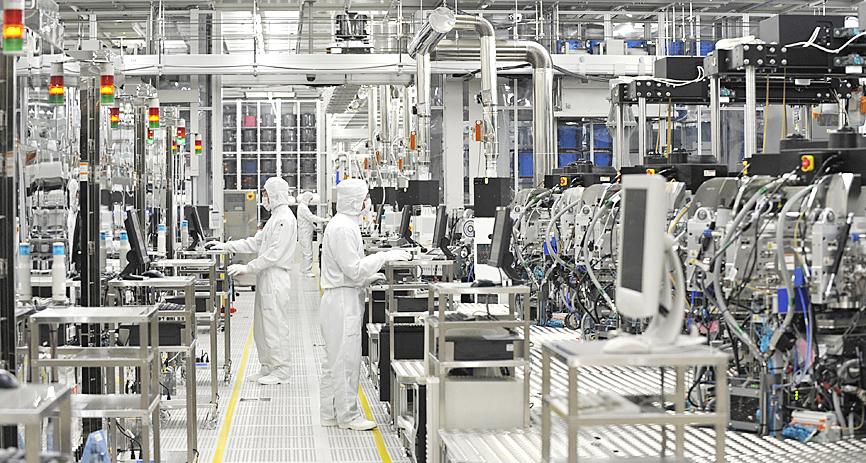Japanese chip manufacturer Renesas Electronics Corp on Saturday restarted production about a month after a factory fire that threatens to worsen a global chip shortage, local media said.
The fire on March 19 at its plant near Tokyo came with automakers already battling semiconductor supply problems, in part because of increased demand for chips from manufacturers of laptops, tablets and gaming devices.
Renesas, a key supplier of automotive semiconductors, saw 600m2 of factory floor damaged in the blaze.

Photo: AFP
The company said on April 10 that it completed repairs in the fire-hit cleanrooms and they came online for initial output.
Jiji Press and other news reports said the firm partially began production on Saturday morning, with plans to ship initial products in about a month.
Immediate confirmation of the reports was not available.
Renesas has so far hoped to restart operations at the factory unit producing 300mm wafers — a key piece of tech for modern vehicles — in about a month.
The plant would not return to 100 percent capacity for “between 90 days to 120 days,” CEO Hidetoshi Shibata said late last month.
Company officials were tight-lipped about which of their customers would receive early supplies of semiconductors, and also said it would take more time to pinpoint the cause of the fire.
With the blaze sparking concern about the impact on the world’s chip supply, Japan’s government and some of Renesas’ customers, including auto giant Toyota Motor Corp, have offered help.
During a summit on Friday in Washington, Japanese Prime Minister Yoshihide Suga and US President Joe Biden agreed to “partner on sensitive supply chains, including on semiconductors, promoting and protecting the critical technologies that are essential to our security and prosperity,” their joint statement said.

AI SERVER DEMAND: ‘Overall industry demand continues to outpace supply and we are expanding capacity to meet it,’ the company’s chief executive officer said Hon Hai Precision Industry Co (鴻海精密) yesterday reported that net profit last quarter rose 27 percent from the same quarter last year on the back of demand for cloud services and high-performance computing products. Net profit surged to NT$44.36 billion (US$1.48 billion) from NT$35.04 billion a year earlier. On a quarterly basis, net profit grew 5 percent from NT$42.1 billion. Earnings per share expanded to NT$3.19 from NT$2.53 a year earlier and NT$3.03 in the first quarter. However, a sharp appreciation of the New Taiwan dollar since early May has weighed on the company’s performance, Hon Hai chief financial officer David Huang (黃德才)

The Taiwan Automation Intelligence and Robot Show, which is to be held from Wednesday to Saturday at the Taipei Nangang Exhibition Center, would showcase the latest in artificial intelligence (AI)-driven robotics and automation technologies, the organizer said yesterday. The event would highlight applications in smart manufacturing, as well as information and communications technology, the Taiwan Automation Intelligence and Robotics Association said. More than 1,000 companies are to display innovations in semiconductors, electromechanics, industrial automation and intelligent manufacturing, it said in a news release. Visitors can explore automated guided vehicles, 3D machine vision systems and AI-powered applications at the show, along

FORECAST: The greater computing power needed for emerging AI applications has driven higher demand for advanced semiconductors worldwide, TSMC said The government-supported Industrial Technology Research Institute (ITRI) has raised its forecast for this year’s growth in the output value of Taiwan’s semiconductor industry to above 22 percent on strong global demand for artificial intelligence (AI) applications. In its latest IEK Current Quarterly Model report, the institute said the local semiconductor industry would have output of NT$6.5 trillion (US$216.6 billion) this year, up 22.2 percent from a year earlier, an upward revision from a 19.1 percent increase estimate made in May. The strong showing of the local semiconductor industry largely reflected the stronger-than-expected performance of the integrated circuit (IC) manufacturing segment,

NVIDIA FACTOR: Shipments of AI servers powered by GB300 chips would undergo pilot runs this quarter, with small shipments possibly starting next quarter, it said Quanta Computer Inc (廣達), which supplies artificial intelligence (AI) servers powered by Nvidia Corp chips, yesterday said that AI servers are on track to account for 70 percent of its total server revenue this year, thanks to improved yield rates and a better learning curve for Nvidia’s GB300 chip-based servers. AI servers accounted for more than 60 percent of its total server revenue in the first half of this year, Quanta chief financial officer Elton Yang (楊俊烈) told an online conference. The company’s latest production learning curve of the AI servers powered by Nvidia’s GB200 chips has improved after overcoming key component